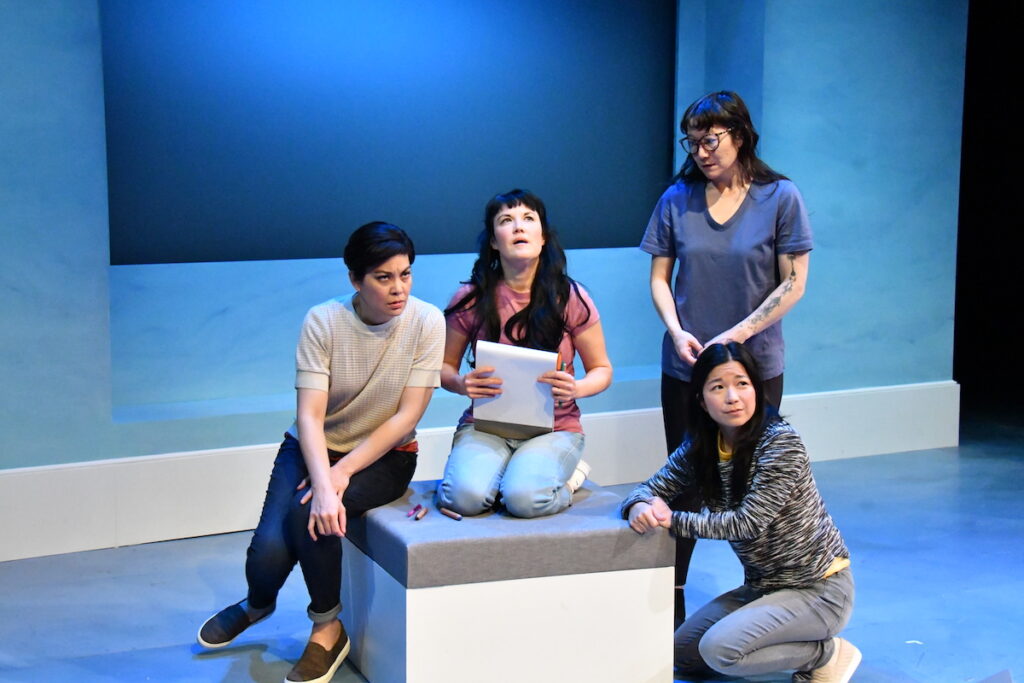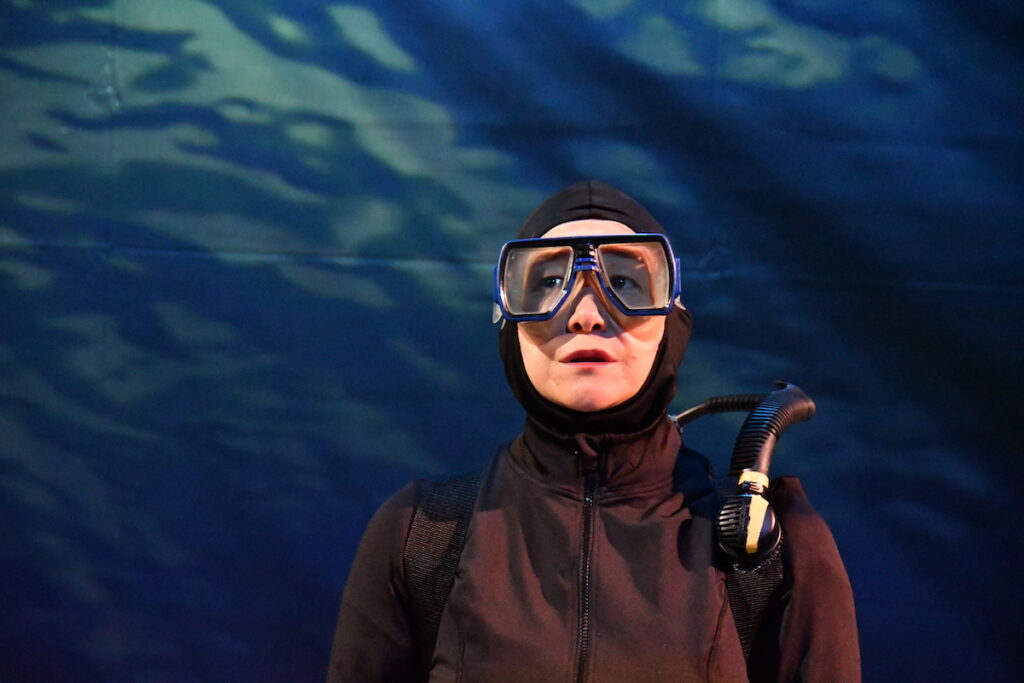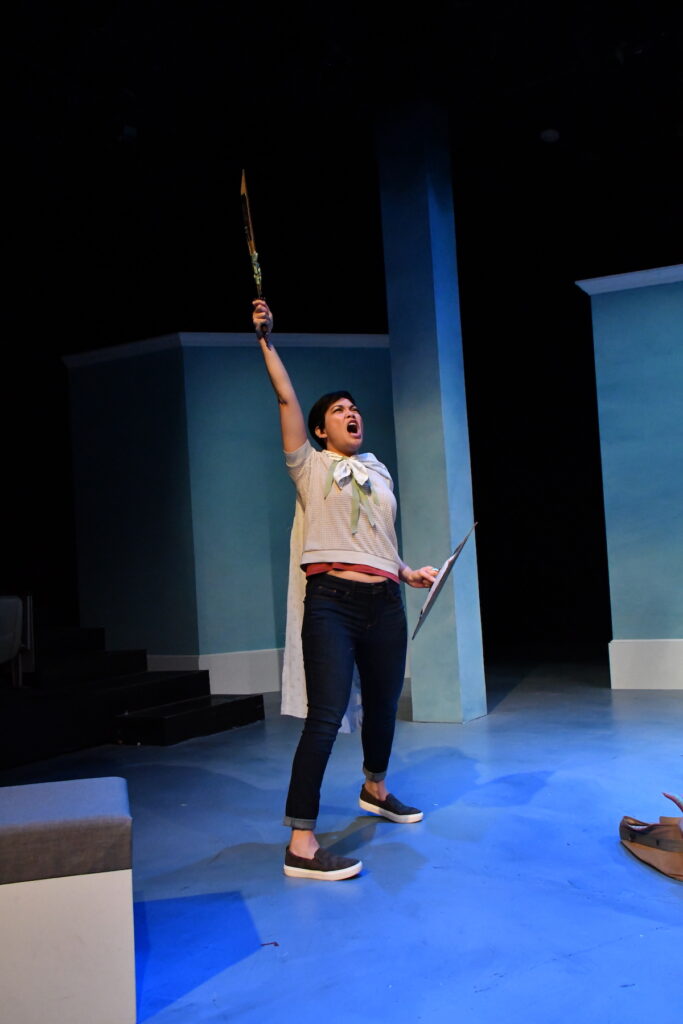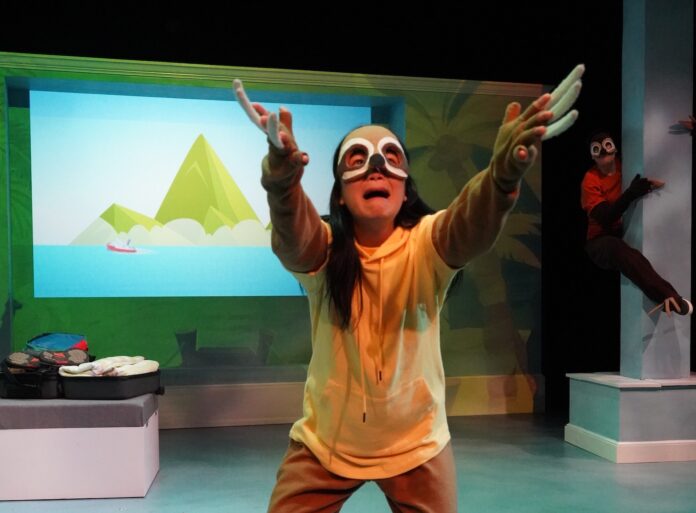Opening night for Monument, or Four Sisters (A Sloth Play)—through May 29 at Magic Theatre—was a tense experience for someone COVID-conscious. Aside from the Magic’s usual glance-‘n-wave vax check, the lobby of its Fort Mason building was crowded with SF teens attending prom in the ground-floor dining hall, all of them unmasked. Add to that the frustration of seeing an old white man in the front row of our audience who refused to mask up the entire show.
I certainly don’t blame artistic director Sean San José for that, especially since his pre-show speech was one of the few to put a deep emphasis on mask and vax safety (“This ain’t Texas or Georgia,” he joked). It’s just that after the gauntlet of unmasked prom kids, I was secretly hoping that he or one of the cast member would notice the old man and create a Patti LuPone moment for all of us still masked.

Such was not to be, so I had to settle for my second strong show with an Asian cast within the span of a few days (after The Paper Dreams of Harry Chin at SF Playhouse).
Sam Chanse’s three-pronged title could easily lead one to think of Pygmalion, a certain Chekov play, and either a children’s entertainment or an Orwell-style satire. I dare say all the above were influences in one way or another. The play actually reminded me of the recent OTP/Ferocious Lotus production of Endlings, which similarly featured a primarily Asian cast, deep-sea diving, and a quasi-meta sub-plot in which a female Asian writes pushes back against her industry’s traditional white narratives. The way this one does it is almost as surreal.
Monument, as its mouthful title suggests, revolves around four sisters: marine scientist Amy (Erin Mei-Ling Stuart), who has both a toddler and a marriage on the rocks; TV writer Constance (Rinabeth Apostol), whose participation in a popular sloth-based animated series explains the term’s presence in the title; out-of-work playwright Mac (Sango Tajima), who was forced to leave her dream job with an art troupe after an incident on which she refuses to elaborate; and the rarely-seen Lina (Lisa Hori-Garcia), whose life is defined mostly by “the toxic guy her sisters wish she would leave.”

The plot, if it can even be called such, is secondary to what we learn about the sisters as characters as they react to what happens around them. Constance, a meticulous person who laments the lack of control she has in a mostly white male writers’ room, tends to turn her ire on Mac, whom Constance considers a layabout. Amy, rather than work on her marriage, is off to explore one of the few barrier reefs that has somehow evaded mass coral bleaching. As stated, we don’t know much about Lina, other than she’s with a terrible guy and would be the other sisters’ barrier—hint, hint—from their notoriously temperamental father (represented off-stage by a booming soundtrack from Sara Witsch).
If the story can be considered “about” anything, it’s about how everyone has their breaking point, their point of no-return where a problem is so dire that it can’t be solved with a simple “I’m sorry.” Somehow, this is made all the more apparent by contrasting it with episodes of an animated series (opening credits by Sarah Phykitt) in which every problem is solved through deus ex machina. Three anthropomorphized Latin-American sloths, with strangely US-based personalities, find themselves in a conundrum until a fourth sloth, the only female, arrives in pink leather on a bitchin’ motorbike, using her amazing science skills to save the other three boys.
If that character sounds too good to be true, she is. Constance’s minority status in her writers’ room is exacerbated with by having only one female character and by that character needing to be all things to all people, because she’s the only female the core cast ever encounter. And don’t get Constance started on having to tiptoe around racial sensitivity with white dudes writing for a show set in Latin America (she had to fight tooth-and-nail to nix a storyline about “border-jumpers”). Constance’s role, and the character she constructs, are the end result of institutional racism and misogyny in an industry that refuses to evolve.

That same misogyny is likely at the heart of Mac’s dismissal from her theatre troupe, which she only vaguely alludes to as involving an incident with a male superior. It’s a conversation that grows more uncomfortable with each passing mention. Her brow-beating from Constance about avoiding the issue is all the more pronounced when compared to Amy literally escaping to the bottom of the sea to avoid her crumbling marriage (to a woman, BTW). Whatever flaws Chanse’s script may have with the occasional tangent that goes on too long, she makes up for with her empathetic characters.
Helping her succeed in this task are director Giovanna Sardelli’s strong cast, all of whom number among the most reliable of Bay Area performers—even the ones who no longer live in the Bay Area. Dancer Erin Mei-Ling Stuart, who I last saw in the film Girl in Golden Gate Park, brings the right on-the-brink frustration to Amy, desperate to swim in the coral reefs lest she violently explode at someone close to her. The ever-in-demand Rinabeth Apostol, last seen at The Magic for The Chinese Lady, personifies a different frustration for Constance, who checks herself lest an outburst be considered representative of every minority.
Sango Tajima brings her usual pixie energy to Mac, even in the more reserved soliloquies: She has an artist’s urge to constantly create, but has to reconcile the fact that certain forces won’t allow it. What little we see of the Lisa Hori-Garcia, now based in Colorado, is often behind Michelle Mulholland’s sloth costuming, but it’s no less entertaining.
Though it stretches a touch long in its runtime, Monument is a fine example of People of Color frustration with a world literally being bleached to the point of destruction. It’s exemplary of why having a seat at the table doesn’t mean you have a voice. If those points resonate with you, I recommend checking it out. Hopefully, not on a night full of unmasked prom kids.
MONUMENT, or FOUR SISTERS (A SLOTH PLAY) runs through May 29 at Magic Theatre in Fort Mason, SF. Tickets and info here.






